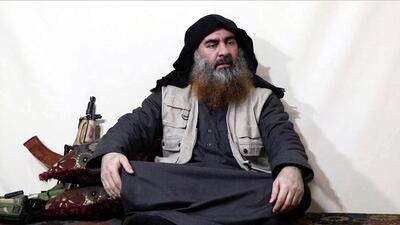Security analysts have noted an surge in pro-ISIS social media posts after the death of leader Abu Bakr Al Baghdadi and predict a flow of new support for the group.
The increased traffic comes despite the terror group failing to officially acknowledge Al Baghdadi’s demise.
The Counter Extremism Project, which monitors posts by radicals, says ISIS members have been using social media to reaffirm their allegiance and pledge to continue fighting.
David Ibsen, the project's executive director, told The National that the terrorist group would use Al Baghdadi's death as an opportunity to expand its online presence.
“Official ISIS news channels have been posting regular propaganda including stories of attacks by ISIS fighters around the world and photos of captured weapons,” Mr Ibsen said.
“Individuals in pro-ISIS chats on Telegram have been urging patience and warning users not to believe non-ISIS media or spread rumours.
"Some chatroom participants have discussed the concepts of martyrdom and perseverance, and have repledged their support to ISIS.
“It is likely that there will be increased online activity, such as the creation of new Telegram channels, prior to the release of an official statement by the group.
"ISIS continues to have a sustained Telegram presence and might take the opportunity of an appointment of a new leader to try to expand online activity, especially on Telegram.”
ISIS supporters have already been posting rallying calls in chatrooms.
Abu Abdullah Asy Syami, posted: "Jihad will never stop, even if our own caliph dies."
Another wrote: “The creed does not die with the death or killing of men.”
Terrorism analyst Michael Smith, a lecturer in Johns Hopkins University’s global security studies, said Al Baghdadi’s death did not interrupt the group’s official propaganda output.
“The group’s propagandists have continued to refer to its members as 'soldiers of the caliphate' in official propaganda produced since his death,” Mr Smith said.
“News of Baghdadi’s death has not had an effect of reducing exploitation of traditional social media platforms like Twitter, and “dark” pseudo social media platforms like Telegram Messenger channels and chatrooms to promote official and unofficial pro-ISIS propaganda.
"The group has continued pushing out the steady stream of reports issued throughout each day on its operations.

“From a counter-terrorism perspective, the manner in which Baghdadi died is ultimately very problematic, as it makes him an even greater exemplar of the global movement he aspired to lead.
“By killing himself rather than being killed or captured by American forces, Baghdadi enhanced ISIS’s capacity to use his legend to continue building and reinforcing support for the group.
“Regardless of whether ISIS attempts to capitalise on his death with a propaganda campaign focused on its dead 'caliph', Baghdadi’s life, and particularly his death will almost certainly inspire many people to join and provide support to groups like ISIS.”
Chelsea Daymon, terrorism researcher at the American University’s School of Public Affairs, said some ISIS supporters were claiming Al Baghdadi’s death did not occur.
“There has been speculation about Baghdadi's death by ISIS supporters in unofficial ISIS Telegram groups, but they seem to be holding out hope that the 'rumours' of Baghdadi's death are untrue," Ms Daymon said.
“Supporters have been posting images as well as past audio messages of Baghdadi, with sentiment, offering prayers for his safety and such.”
On Monday the UK announced it was increasing security monitoring of known terror suspects over fears of retaliatory attacks.
Malaysian police counter-terrorism chief Ayob Khan Mydin Pitchay said the real concern was not ISIS's leadership but the effect of its teachings.
"It's good news but his death will have little impact here as the main problem remains the spread of the ISIS ideology," he said.
"What we are most worried about now are 'lone wolf' attacks and those who are self-radicalised through the internet.
"We are still seeing the spread of Isis teachings online. ISIS publications and magazines from years ago are being reproduced and reshared.”
ISIS has used social media to glorify its cause and has issued recommended private messaging apps to its followers, specifically Telegram.
It was through Telegram that ISIS has claimed responsibility for terror attacks, including the Westminster attack in London and the Manchester Arena bombing.


